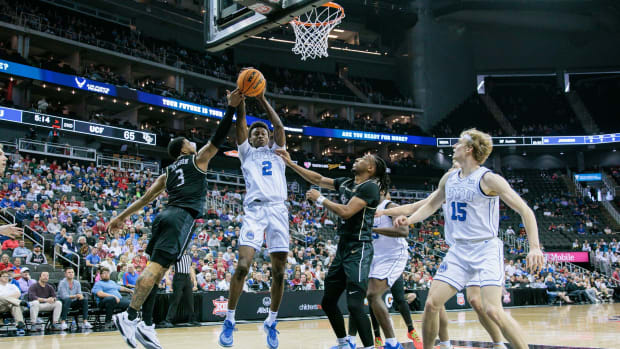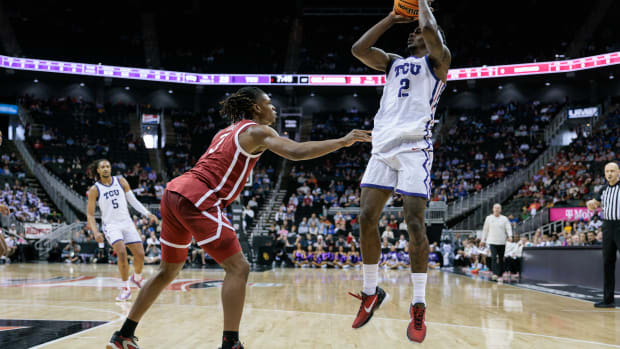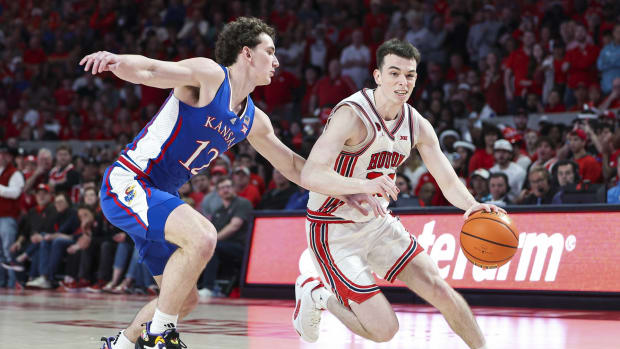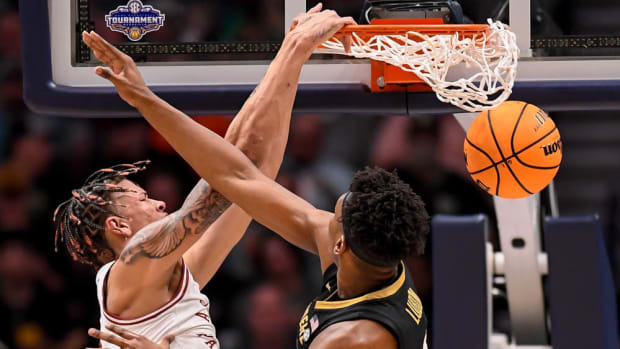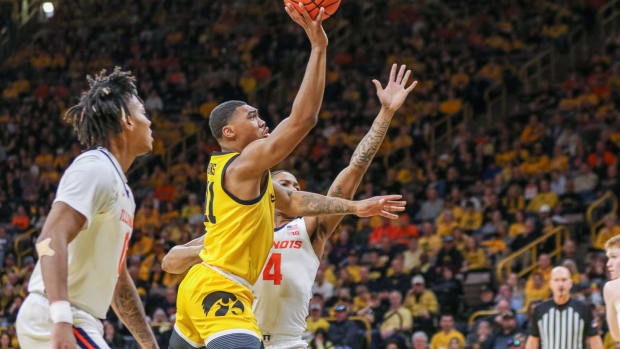How Kellie Harper’s Past As a Player Is Shaping the Vols’ Future
The day before a fan event in Knoxville in mid-October, Volunteers coach Kellie Harper figured out exactly what she was going to wear. Collecting dust on a coat rack inside her office was a relic from her past: the white, No. 14 jersey she sported during her freshman season at Tennessee. She was sure it would bring smiles to the faces of both her players and the school’s rabid supporters.
Senior center Tamari Key said the jersey gave her “all the feels.” Senior guard Jordan Horston, however, questioned its authenticity. “I did not know it was an actual jersey,” she said. Adding about its thick material, “If we wore that today then I would be sweating bullets."
Harper’s jersey from her days as the team’s point guard paid homage to a time when the Vols ruled the sport. Their run from 1996 to ’98 proved to be the lone three-peat in Hall of Fame coach Pat Summitt’s 38-year tenure. Horston says it’s very special to have a coach who “knows the ropes” of the program, who was coached by Summitt and who “knows what the expectations are.”
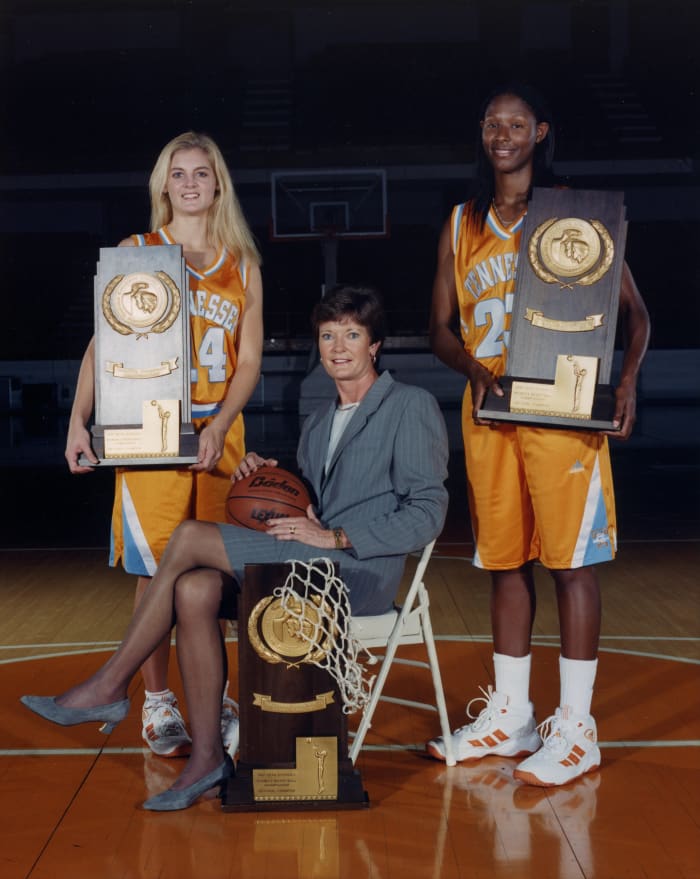
Kellie Harper (left) and Chamique Holdsclaw both won three championships under legendary Tennessee Vols coach Pat Summitt.
Courtesy of Tennessee Athletics
Ten seasons have passed since Summitt retired from coaching. Even after her death in 2016, her presence is still unavoidable. Across the street from Thompson-Boling Arena is Pat Summitt Plaza, on which an eight-foot, seven-inch bronze statue of the coach was placed in ’13. In the team’s locker room there is a mural listing Summitt’s Definite Dozen, the 12 principles she popularized as a means to create success in basketball, and life. (“It’s Tennessee’s most basic set of rules,” Summitt wrote in her 1998 book Reach for the Summit.) In Harper’s office, there are a number of mementos from her playing days in which Summitt is prominently featured. Among her favorites is a picture from one of her final two seasons that shows the legendary coach dishing her trademark icy-blue stare out to the point guard.
Just over two decades after that photograph was taken, Harper now enters her fourth season as the Vols’ coach. The program, with a number of key returners and additions via the transfer portal, is No. 5 in the preseason Associated Press poll, its highest mark entering a season since 2015–16. It’s possible this year’s team is the university’s most talented since Summitt retired.
Harper, 45, openly discusses their lofty aspirations, but she’s well aware that merely putting on the orange-and-white jersey does not mean a net will be cut down in March. While some draw similarities between her and Summitt, Harper hopes to make her own mark with the Vols—it’s a constant balancing act of holding ties to the past while trying to be forward-looking.
“It’s important that we do two things here,” she says. “We have to honor and celebrate the tradition. We absolutely have to. But we also have to stay current and relevant as well.”
Hall of Fame forward Tamika Catchings is a firm believer the toughest position to play under Summitt was point guard. The reason: Summitt pushed them to be extensions of her. On the floor, “KJ had to be Pat,” Catchings explains.
While difficult, doing so came naturally to Harper, who always tried to think like a coach. Her father, Kenneth Jolly, was a high school assistant principal and basketball coach in Sparta, Tenn., showing such proficiency on the sideline that Summitt admitted (in her book) to stealing one of his in-bounds plays while she was recruiting Kellie.
The way Harper grew up around the sport, says Al Brown, a Vols assistant coach for the women’s program from 1995 to 2002, meant that learning under Summitt “wasn’t that different.” Brown says she came into Knoxville with a “better understanding of the game than most people because she just lived it with her family.” That knowledge is part of why Harper, despite not being the best physical athlete, was still an impactful player with the program: Then Kellie Jolly, she appeared in 132 games, scored 894 points and totaled 452 assists, and was an honorable mention All-American in 1999.
Brown remembers spending countless hours watching film with the future Vols coach. As they watched, he recalls, the duo constantly talked through the decision-making process of what had occurred in game play and what might occur going forward.
Catchings says that Harper could have led film sessions from all the video she consumed. “She really spent a lot of time studying ways for our team to get better,” says Catchings. Two-time Naismith Award winner Chamique Holdsclaw adds that every time she went out on the court, she felt Harper made sure everyone was in the best spot possible, a confidence that derived from her preparation.
From the first time both Catchings and Holdsclaw met Harper, they believed she would one day coach. In addition to her basketball prowess, Catchings says Harper is “one of those people who wanted to make sure everyone was comfortable.” Holdsclaw says she often served as a “go-between” for Summitt, her assistants and the team’s players.
In her book, Summitt lauded Harper’s ability to understand concepts quickly. “All you have to do is say something once to Kellie, and she does it,” she wrote. Summitt additionally noted “people like Kellie can influence a whole team or organization.”
“What happens is, people start believing in her,” Summitt wrote. “If Kellie says something is going to take two weeks instead of four, that’s what happens.”
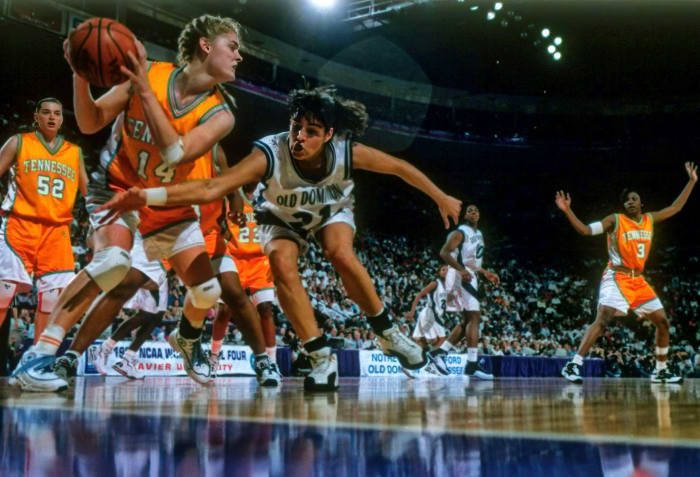
Tennessee Vols coach Pat Summitt praised point guard Kellie Jolly (now Kellie Harper) for her intelligence as a player. Decades later, Harper serves as the head coach of her college program.
Heinz Kluetmeier/Sports Illustrated
That belief has been apparent at every collegiate stop she’s had. Before getting the Tennessee job, Harper was a head coach at Western Carolina, NC State and Missouri State, making the NCAA tournament at least once with each program. Today, Harper is one of just two women’s coaches to have made March Madness at four different schools.
In the spring of 2019, Harper replaced Holly Warlick, who spent seven years as the program’s head coach after serving 27 as a Summitt assistant. At her introductory press conference, Harper made it clear she was not trying to be Summitt. “Realistically it’s in our human nature to teach how we learn,” says Candace Parker, who starred under Summitt from 2004-08. “The biggest thing is understanding that you are a product of coach Summitt, but you still have to have your own identity.”
Catchings, now a commentator for SEC Network, says she assumes one of the reasons that Summitt sought out Harper’s services in the first place was because of their similarities. “Quiet but fierce,” she says.
Catchings points to how Harper crouches on the sideline, in a manner similar to Summitt, and says she occasionally feels déjà vu listening to Harper address her team because of the messages she relays. Holdsclaw observes commonalities in how they connect to players of different backgrounds, and how they have created familial environments—often, literally, by having their children around. Brown and current Vols alike note that both coaches are diligent in how they explain concepts in practice and incredibly descriptive in how they teach the game.
There is one attribute Harper definitely does not have, however.
“I don’t think she has the Summitt Stare,” Brown says, “although she certainly makes her wishes come forth.”
Harper agrees, admitting that, like Summitt, she’s “got some twang in me when I get heated.” But of the “piercing” stare: “I have to come at it from a different angle.”

Former Tennessee Vols head coach Pat Summitt was known for her intense, icy stare on the court.
Heinz Kluetmeier/Sports Illustrated
During the summer heading into the 2021–22 season, Harper gave each of her players a copy of Reach for the Summit. The reading assignment, she says, was “as much of a history lesson for our team as it was a character-building” one. Key was struck by Summitt’s principle that “change is a must.” To Horston, “make hard work your passion” was an especially resonant concept.
“When you are self-motivated, it’s gonna be very hard for anyone to stop you,” she says. “Pat Summitt said it, so I gotta make it my passion.”
Last year, Horston blossomed, leading Tennessee in scoring (16.2 points per game), rebounding (9.4), assists (4.0) and steals (1.4). Her play helped the Vols get off to an 18–1 start, its best mark since 2008–09, and climb to No. 4 in the AP poll, its highest-ranking since ’15–16. By mid-January, however, with more public eyeballs on the program, Harper, Key and Horston agreed that players felt an intense pressure. “During that time they started worrying about the next game, and not enjoying the next game,” Harper says. “It’s hard, but in that moment we were worried about the wrong things.”
A month later, their season would take a downward turn. Horston dislocated her left elbow in a loss to Alabama and would miss the rest of the year. Before every game, as her teammates readied in the locker room, she found a bathroom stall and cried, saddened she couldn’t be out there alongside them. It was hard, she says, to watch the program go 4–4 in her absence. When the final buzzer sounded in the Vols’ 76–64 Sweet 16 defeat to Louisville, she couldn’t help but wonder what would have been different had she been healthy enough to suit up.
Such tribulations, though, are why Key feels even more confident about this year’s group. Named to the preseason All-SEC first-team this fall, Key says last year’s second half better prepared them to deal with high expectations and know how to better react when adversity strikes. Her coach feels similarly. “You have to learn how to live in that space before you can be successful in that space,” Harper says.

Tennessee Vols head coach Kellie Harper—who played at the school under Pat Summitt—says she tries to honor the program's past while looking toward the future.
Saul Young/News Sentinel/USA TODAY NETWORK
Horston says she feels even more explosive this fall—a scary thought for defenders she’ll go up against. But integral to the Vols’ success will also be the impact of their four transfers: 2021–22 All-SEC first-team forward Rickea Jackson, who previously played at Mississippi State; forward Jasmine Franklin, last year’s Mountain Valley Conference Defensive Player of the Year; ’20–21 All–Big Ten second-team guard Jasmine Powell; and forward Jillian Hollingshead, who was a McDonald’s All-American but dealt with an illness and injuries during her freshman season at Georgia.
High expectations were “just the way we did business” at Tennessee, says Brown, the former Summitt assistant turned Harper mentor. He recalls a time before the 1995–96 campaign in which Summitt walked into his office frustrated that they weren’t ranked No. 1 in the country (they would end up winning the national title that year). To see this year’s group win, he says, “would bring back great memories to Tennessee, of when Pat was the coach.”
But in a sentiment that still rings true, Summitt wrote, “Every year, we get one or two players who think that just being at Tennessee is enough, that all they have to do is stand on the basketball court and breathe in and out, and we will win titles.
“I promise you, I cure our players of this type of thinking. It starts the moment they arrive.”
Tennessee has not made the Final Four since 2008, when Parker led the Vols to their second consecutive championship. Nearly 15 years later, Parker still speaks of Summitt’s impact on her with great renown. “Everything that she wanted us to do, she did herself,” Parker says. “Every day that’s how I try to be.”
Harper has a similar fondness for the coach who recruited her. But she tries not to inundate her team with stories from her playing days. Instead she’ll bring up a tale from the Summitt era only if it’s relevant, or if the program’s past experiences could be utilized by the women on her active roster.

The Tennessee Vols won eight championships under Pat Summitt, but have not made a Final Four appearance since 2008.
Heinz Kluetmeier/Sports Illustrated
“I love what I did as a player,” Harper says. “I want them to have that same love and passion.”
Before taking the job, Harper couldn’t help but wonder what it would feel like to lead the Vols back to a Final Four. Entering her fourth year as its coach, she still has occasional visions of what climbing up a ladder to cut down the nets would be like. Though, she adds, “I’m too busy to be daydreaming; so I don’t get to do it a whole lot.”
Presently, Harper is focused on creating a culture she says is built on togetherness, toughness, unity and respect. Their season opener Nov. 8 vs. Ohio State is a quality test, and a difficult schedule that includes nonconference matchups against top-15 teams Indiana, Virginia Tech and Stanford awaits. Much like their coach, Tennessee players are trying to leave their own legacy, all while acknowledging those who came before them.
“Every time we step on that court we know we’re honoring Pat,” Horston says. “We always say she’s watching over us.”


